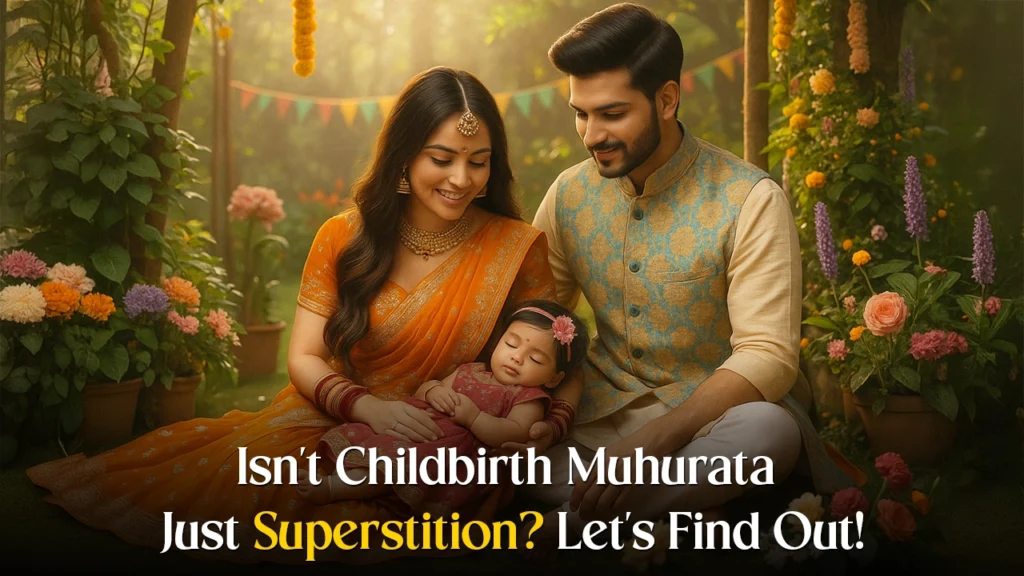Isn’t Childbirth muhurat Just Superstition
The practice of selecting an auspicious childbirth muhurat—a precise birth time aligned with planetary positions—has been debated for centuries. While skeptics dismiss it as outdated superstition, millions of families in India and beyond continue to trust this ancient Vedic tradition. But is there more to it than meets the eye? Let’s separate myth from reality with insights from Astrologer Hanish Bagga, a leading authority on Vedic astrology and childbirth timing.
What is Childbirth muhurat?
In Vedic astrology, a muhurat refers to an auspicious window of time chosen to maximize positive cosmic influences. For childbirth, this involves selecting a birth time that aligns with favorable planetary positions, nakshatras (lunar constellations), and tithis (lunar days). The goal is to imbue the child’s birth chart with energies that promote health, intelligence, prosperity, and spiritual growth.
Key Components of muhurat Selection
- Nakshatras: Stars like Rohini (creativity), Pushya (nurturing), and Uttara Phalguni (leadership) are prioritized.
- Planetary Positions: Jupiter (wisdom), Venus (harmony), and the Moon (emotions) must be favorably placed.
- Avoiding Malefic Influences: Rahu-Ketu conjunctions, Saturn’s harsh aspects, and eclipses are avoided to minimize challenges.
Read about: What is the cost of an astrology consultation with Astrologer Hanish Bagga?
The Science vs. Superstition Debate
The Skeptical Perspective
Critics argue that childbirth muhurat lacks empirical evidence and conflicts with modern medicine. Key points include:
- Medical Realities: Due dates are estimates, and spontaneous labor often defies precise timing.
- Risk of Stillbirth: Delaying delivery for astrological reasons could increase risks post-40 weeks.
- Cultural Bias: The practice is seen as a relic of patriarchal traditions prioritizing astrology over maternal autonomy.
The Case for Tradition
Proponents highlight cultural, psychological, and even scientific nuances:
1️⃣Cultural Continuity: Muhurat preserves ancestral wisdom, fostering familial and spiritual bonds.
2️⃣Psychological Comfort: Parents report reduced anxiety when they feel the child’s future is cosmically protected.
3️⃣Lunar Influence: Studies suggest the Moon’s gravitation may subtly affect birth rates, though not through phases.
4️⃣Holistic Health: Muhurat often includes remedies (mantras, diet tips) that complement medical care.
Hanish Bagga’s Approach: Bridging Tradition and Modernity
Hanish Bagga, founder of Acharya Ganesh, is a trusted name in Vedic astrology with over a decade of experience. His methodology demystifies muhurat by blending astrological rigor with practical sensitivity:
- Medical Collaboration: He prioritizes maternal and fetal health, working within hospital schedules for C-sections.
- Karmic Analysis: Examines parental birth charts to address generational patterns affecting childbirth.
- Remedies for Challenges: Recommends gemstones, mantras, or Vastu corrections to counter planetary afflictions.
- Transparency: Provides detailed reports explaining every astrological factor and its real-world implications.
Common Myths About Childbirth muhurat
Myth 1: “It’s Just About Picking a Lucky Date”
Reality: Muhurat involves complex calculations of planetary transits, nakshatras, and familial karma. For example, Hanish Bagga analyzes the 5th house (children) and 9th house (fortune) in parental charts to identify karmic blessings or obstacles.
Myth 2: “It Conflicts with Medical Advice”
Reality: Ethical astrologers like Hanish Bagga never override doctors. Instead, they refine timing within medically safe windows (e.g., 38–40 weeks) to balance safety and tradition.
Myth 3: “It Guarantees a Perfect Life”
Reality: Muhurat sets a favorable foundation, but upbringing, environment, and free will shape the child’s future.
Why Families Trust Hanish Bagga
- Proven Expertise: Over 1,000 successful muhurat consultations with documented client testimonials.
- Ethical Practice: No fear-mongering; remedies are affordable and culturally respectful.
- Holistic Focus: Integrates Vastu, Lal Kitab, and Ayurvedic principles for comprehensive care.
The Bigger Picture: Tradition in a Modern World
Childbirth muhurat isn’t about rejecting science—it’s about enriching the journey with intentionality. As Hanish Bagga explains:
Astrology doesn’t replace medical care; it complements it. When a family chooses a muhurat, they’re not just picking a time—they’re setting an intention for love, protection, and purpose.”
For many, this practice represents hope, cultural pride, and a profound connection to the cosmos. Whether you’re a believer or skeptic, understanding its nuances fosters empathy in an increasingly polarized world.
The Cultural Roots of Childbirth muhurat
Childbirth muhurat is deeply interwoven with India’s spiritual and social fabric. Historically, it served as a way to:
- Honor Ancestral Lineage: Families believed aligning a child’s birth with auspicious stars would please ancestors and ensure their blessings.
- Strengthen Community Bonds: Elders and astrologers collaborated to select muhurats, fostering intergenerational dialogue and unity.
- Celebrate Cosmic Order: By timing births to planetary rhythms, communities acknowledged humanity’s connection to the universe.
Today, even urban families use muhurat as a bridge between modernity and tradition. For example, a Mumbai-based couple shared how consulting Hanish Bagga helped them navigate familial expectations while scheduling a C-section safely during Pushya nakshatra.
Read about: What Should You Ask During a Childbirth muhurat Consultation?
Psychological Benefits: Why Minds Matter
Beyond astrology, muhurat offers tangible mental health advantages:
- Reduced Anxiety: Parents often feel empowered knowing they’ve “optimized” their child’s cosmic start, easing fears about the future.
- Ritualistic Comfort: The process itself—consulting an astrologer, performing pre-birth rituals—can provide structure during the chaotic perinatal period.
- Family Harmony: Agreeing on a muhurat minimizes conflicts between generations, especially in joint families where traditions hold sway.
A 2022 study in the Journal of Religion and Health found that ritualistic practices during pregnancy (like muhurat planning) correlate with lower stress levels in expectant mothers.
Conclusion of Isn’t Childbirth muhurat Just Superstition
The truth lies in perspective. While childbirth muhurat lacks laboratory validation, its emotional and cultural resonance is undeniable. With experts like Hanish Bagga bridging ancient wisdom and modern pragmatism, families can embrace tradition without compromising safety—proving that sometimes, the stars and science can coexist.
For more informational astrology related videos, subscribe us on YouTube
FAQs about Isn’t Childbirth muhurat Just Superstition
Q1: Does muhurat work for natural births?
Ans- Yes, astrologers identify favorable periods around the due date. However, spontaneous labor is respected, and post-birth remedies can address timing deviations.
Q2: Can muhurat prevent health issues?
Ans- While not a medical solution, it aims to minimize astrological afflictions linked to health. For example, a strong Moon in the birth chart may support emotional resilience.
Q3: Is there any scientific basis for muhurat?
Ans- While direct studies are scarce, the Moon’s gravitational pull shows correlations with birth rates. Astrology’s role in mental well-being is also widely acknowledged.
Q4: How does Hanish Bagga handle emergencies?
Ans- He provides backup muhurats and post-birth remedies (e.g., Rudraksha beads, charity) to mitigate challenges from unplanned timing.
Q5: Does muhurat apply to IVF pregnancies?
Ans- Yes! Embryo transfer or C-section dates can be timed astrologically to enhance success and positive outcomes.
Q6: How much does a consultation cost?
Ans- Hanish Bagga offers tiered pricing (₹5,000–₹48,000) based on analysis depth, including options for post-birth kundali reports.
Q7: Can I trust online consultations?
Ans- Absolutely. Hanish Bagga’s digital sessions include encrypted chart analysis and video discussions for global clients.
Q8: What if my family disagrees with muhurat?
Ans- He mediates sensitively, explaining astrological insights without dismissing skeptics. “The goal is harmony, not dogma,” he says.


